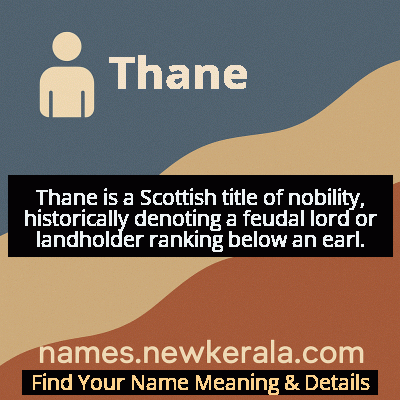Thane Name Meaning & Details
Origin, Popularity, Numerology Analysis & Name Meaning of Thane
Discover the origin, meaning, and cultural significance of the name THANE. Delve into its historical roots and explore the lasting impact it has had on communities and traditions.
Name
Thane
Gender
Male
Origin
Scottish
Lucky Number
3
Meaning of the Name - Thane
Thane is a Scottish title of nobility, historically denoting a feudal lord or landholder ranking below an earl.
Thane - Complete Numerology Analysis
Your Numerology Number
Based on Pythagorean Numerology System
Ruling Planet
Jupiter
Positive Nature
Optimistic, inspirational, and creative.
Negative Traits
Scattered, exaggerating.
Lucky Colours
Yellow, gold, purple.
Lucky Days
Thursday.
Lucky Stones
Yellow sapphire.
Harmony Numbers
1, 2, 9.
Best Suited Professions
Arts, writing, communication.
What People Like About You
Creativity, optimism.
Famous People Named Thane
Thane Bettendorf
Businessman and Philanthropist
Founded successful school supply company and established charitable foundation
Thane Rosenbaum
Novelist and Law Professor
Acclaimed author and legal scholar at Fordham University
Thane G. A. R. McIntosh
Professional Footballer
Played for Scottish Premier League clubs including Kilmarnock
Name Variations & International Equivalents
Click on blue names to explore their detailed meanings. Gray names with will be available soon.
Cultural & Historical Significance
Throughout medieval Scotland, thanes governed districts called 'thanages', administering justice and collecting revenues, making them crucial to the kingdom's administrative structure until the title was largely absorbed into the baronial system by the 15th century. The cultural significance extends beyond aristocracy to represent Scottish identity and heritage, particularly in the Highlands where clan structures mirrored the thane system. In modern times, the name evokes a sense of Scottish pride and connection to a storied past, while also carrying the literary sophistication of Shakespearean drama.
Extended Personality Analysis
Individuals named Thane are often perceived as natural leaders with strong, decisive personalities. They tend to exhibit qualities of responsibility, loyalty, and protective instincts toward those in their care, mirroring the historical thane's role as protector of their lands and people. Thanes typically demonstrate strategic thinking and practical problem-solving abilities, combined with a sense of honor and commitment to their principles. Many Thanes possess an ambitious drive tempered by a strong moral compass, though they may sometimes struggle with balancing personal ambition with collective responsibility.
These individuals often excel in positions of authority where their innate leadership qualities and ability to make difficult decisions serve them well. The name suggests someone who is reliable, courageous, and capable of handling significant responsibilities while maintaining dignity and respect for tradition. Thanes tend to be perceptive judges of character and situations, often serving as trusted advisors or mentors. While they can be reserved in expressing emotions, they form deep, loyal bonds with those who earn their trust. Their combination of strength and sensitivity makes them effective leaders who inspire confidence and respect in both personal and professional contexts.
Modern Usage & Popularity
In contemporary times, Thane remains an uncommon but distinctive choice for boys, particularly popular in Scotland and among families with Scottish heritage. The name has maintained steady but low usage since the 19th century, with occasional spikes in popularity following cultural events or media appearances. In recent decades, Thane has seen renewed interest as parents seek unique yet historically significant names that aren't overly common. It ranks outside the top 1000 names in most English-speaking countries but enjoys stronger usage in Scotland and regions with significant Scottish diaspora communities. Modern parents are drawn to Thane for its strong historical connections, literary prestige, and the appealing combination of strength and sophistication it conveys. The name's rarity makes it an excellent choice for parents wanting a distinctive name that won't be shared by multiple classmates, while its clear pronunciation and spelling make it accessible across different cultures and languages.
Symbolic & Spiritual Meanings
Symbolically, Thane represents leadership, nobility, and service. The name evokes images of medieval warriors and administrators who balanced martial prowess with governance responsibilities. It symbolizes the transition from warrior to statesman, embodying both strength and wisdom. Metaphorically, Thane suggests someone who stands as a pillar of their community—reliable, protective, and honorable. The name carries connotations of land stewardship and hereditary responsibility, representing continuity between past and present. In psychological terms, Thane symbolizes the archetype of the responsible leader who must navigate complex moral landscapes while maintaining their integrity. The Shakespearean connection adds layers of meaning related to ambition, fate, and the consequences of power, making Thane a name rich with symbolic depth and historical resonance. It represents the ideal of service to something greater than oneself while maintaining personal agency and moral autonomy.

